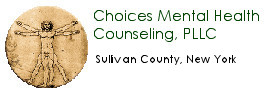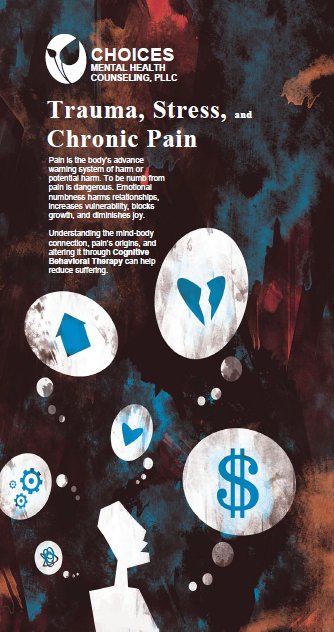Submitted by tomrue on
Old Traumas Add To Present Pain
Many women, and more men than might be generally assumed, who suffer chronic physical pain were sexually abused as children. Many others of both genders experienced physical or verbal abuse during their youth.
There can be little doubt that traumatic experiences in childhood invite chronic pain during later life. Childhood trauma can lead to lasting depression or anxiety, sometimes including flashbacks to the original experience, a condition known as Post-traumatic Stress Disorder, or other complications.
DOWNLOAD A PDF OF THE BROCHURE BY CLICKING ON THE IMAGE. HARD COPIES ARE AVAILABLE IN THE OFFICE.
Ties between physical pain and psychiatric conditions – including PTSD, mood and anxiety disorders, or intimacy problems – caused by abuse are close. The appearance of pain, even decades after the abuse, may be accompanied by flashbacks and nightmares, emotional numbness, or an impaired body image.
Thoughts > Beliefs > Perceptions > Experience
Childhood abuse may contribute to multiple chronic physical complaints or sexual problems in adulthood. Grown children who experienced trauma may undergo depression, anxiety, and low self-esteem, made worse by a vicious cycle of negative thoughts, self-talk, and beliefs. Changing these thought patterns and perceptions can lead to shifts that are both subtle and radical in how one experiences the world and relationships. Life can improve!
Everyone feels pain differently. Some can readily cope with a degree of discomfort that others may find unbearably severe. It comes down to learning.
Consequences of Sexual or Physical Abuse?
Childhood trauma can affect adult learned coping skills. Some survivors of traumatic or deeply confusing events may use alcohol or other drugs to numb, or self-medicate, sadness or pain that otherwise seems intolerable.
This includes physical pain and functional disorders, as well as pain that is psychological or spiritual. Alcohol or substance may seem to work for a while, but addiction tends to spiral out of control.
Another method some survivors used to get through otherwise intolerable experiences is to "zone out" - a mental defense known as dissociating. One whose personhood and dignity has been repeatedly assaulted with fists, weapons, unwanted penetration or molestation, emotional, severe verbal or physical violations, may learn to turn off cognitive process, psychologically blocking out what is occurring. This leads to a split between mind and body.
Body, Mind, and Spirit are One Entity (YOU!)
The genuine painful consequences of abuse are still present, but may show themselves differently. Health care providers who focus on curing bodily organs and systems may sometimes have trouble pinpointing the root cause of pain, paralysis, seizures, or loss of feeling or consciousness, if faulty psychological coping mechanisms learned from abuse remain unrecognized.
Likewise, the spiritual and emotional injuries of sexual abuse may express itself in adults in the form of genital pain or functional impairment. When recognized, these maladaptive responses can be changed. Letting go of shame, summoning the courage to talk about personal topics, starts the healing of such wounds.
Medical diagnostic testing and recommended treatments are the first line approach to chronic pain and functional disorders, and well they should be. At the same time, if one was abused as a child or not, cognitive behavioral therapy has been found to be effective in helping to cope with or manage pain and relationships. Antidepressants or other psychiatric medications prescribed by your psychiatrist or PCP can also help stabilize chronic pain syndrome.
Your Pain Is Real
To say that pain's cause may be related to learned coping skills which were first adopted to survive past trauma does not mean physical suffering and related functional impairment is unreal or "all in the head". Your pain is real.
Tension or migraine headaches, pelvic inflammation, sexual dysfunction, certain cancers, fibromyalgia, irritable bowel syndrome, acute anxiety attacks, to name a few, may feel excruciating and seem to never let up.
Such illnesses and emotional effects can take a toll on intimate relationships, parenting, work performance, and how you take care of your body and soul.
Ways you used to respond to emotional or physical distress might no longer work for you as they once did. Now they may make things worse. But there is hope.
Conscious daily CHOICES can and will bring many positive changes to your life.
Choosing to do something different with yourself is the first step to healing.

